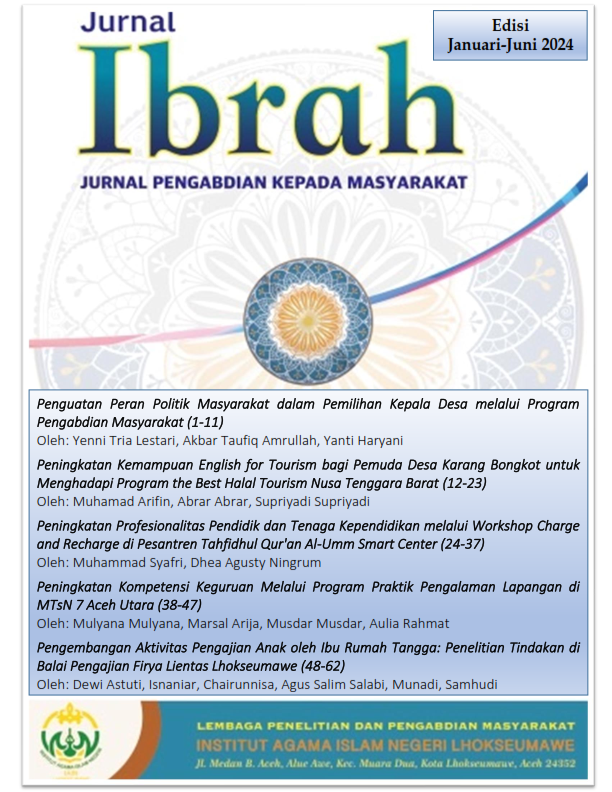Peningkatan Kemampuan English for Tourism bagi Pemuda Desa Karang Bongkot untuk Menghadapi Program the Best Halal Tourism Nusa Tenggara Barat
DOI:
https://doi.org/10.47766/ibrah.v3i1.2363Keywords:
Language Skills Improvement, Tourism Sector, Youth SkillsAbstract
This community service activity focuses on enhancing the English language skills of youth, particularly in the context of English for Tourism, with the aim of increasing their competitiveness in the local job market, especially in the tourism sector. This research employs a descriptive qualitative method with a participatory action research approach. Data were collected through observations, interviews, and questionnaires completed by training participants. Data analysis was conducted qualitatively to assess the effectiveness of the teaching methods and their impact on participants' English skills. The study's findings outline the following steps: 1) Planning, which includes: (a) setting goals and objectives, (b) selecting methods and strategies, and (c) preparing a work plan. 2) Implementation, which combines conceptual learning and field practice, including: (a) structured English courses covering basic conversations, tourism terminology, and practical situations in tourism jobs, and (b) field practice through simulations and hands-on activities at local tourist sites. 3) Evaluation conducted weekly and at the end of the program, to measure achievements and provide notes and recommendations for similar future activities. For follow-up, it is recommended to conduct regular meetings, assign competent PkM students, and optimize campus support by establishing an English language course institution. This program aims not only to improve the English skills of youth but also to support local economic development through the tourism sector and related industries.
References
Arikunto, S. (2019). Dasar-Dasar Evaluasi Pendidikan (3rd ed.). Bumi Aksara.
Bandura, A., & Walters, R. H. (1977). Social Learning Theory (Vol. 1). Englewood Cliffs Prentice Hall.
Creswell, J. W., & Creswell, J. D. (2017). Research Design: Qualitative, Quantitative, and Mixed Methods Approaches. Sage publications.
Fitriani, R. D., Hendrawijaya, A. T., & Ariefianto, L. (2019). Peran Metode Praktek dalam Penguasaan Keterampilan Berbahasa Inggris Peserta Pelatihan di LKP Andi’s English Course Buduan Kabupaten Situbondo. Learning Community : Jurnal Pendidikan Luar Sekolah, 3(1), 49. https://doi.org/10.19184/jlc.v3i1.13573.
Madaus, G. F., Scriven, M. S., Stufflebeam, D. L., Madaus, G. F., Stufflebeam, D., & Scriven, M. S. (1983). Program Evaluation: A Historical Overview. Evaluation Models: Viewpoints on Educational and Human Services Evaluation, 3-22. https://link.springer.com/chapter/10.1007/978-94-009-6669-7_1
Mazur, E., & Somers, M. D. (1999). Peer Instruction: A User’s Manual. American Journal of Physics, 67(4), 359–360. https://doi.org/10.1119/1.19265.
McNiff, J., & Whitehead, J. (2011). All You Need to Know About Action Research. SAGE Publications.
Nisfa, N. L., Latiana, L., Pranoto, Y. K. S., & Diana, D. (2022). Pengaruh Pendekatan Pembelajaran Project Based Learning (PjBL) Terhadap Kemampuan Sosial dan Emosi Anak. Jurnal Obsesi : Jurnal Pendidikan Anak Usia Dini, 6(6), 5982–5995. https://doi.org/10.31004/obsesi.v6i6.3032.
Piaget, J., & Cook, M. (1952). The Origins of Intelligence in Children (Vol. 8, Issue 5). International Universities Press New York.
Prince, M. (2004). Does Active Learning Work? A Review of the Research. Journal of Engineering Education, 93(3), 223–231. https://doi.org/10.1002/j.2168-9830.2004.tb00809.x.
Ramadhani, S. S. (2022). Implementasi Asas Partisipatif Dalam Pembangunan Pariwisata Halal di Kabupaten Lombok Utara (Studi Peran Masyarakat Adat Bayan). Jurnal Lex Renaissance, 7(3), 587–600. https://doi.org/10.20885/JLR.vol7.iss3.art10.
Santoso, L. (2022). Configuration of Halal Tourism in Indonesia: Trends and Dynamics in The Era of Regional Autonomy. Proceeding of International Conference on Islamic Law, 1(1), 163–176. https://prosiding.iainponorogo.ac.id/index.php/cilip/article/view/544.
Stringer, E. T., & Aragón, A. O. (2020). Action Research. SAGE publications.
Sutikno, M. S. (2021). Strategi Pembelajaran. Penerbit Adab.
Uno, H. B., & Mohamad, N. (2022). Belajar dengan Pendekatan PAILKEM: Pembelajaran Aktif, Inovatif, Lingkungan, Kreatif, Efektif, Menarik. Bumi Aksara.
Vygotsky, L. S., & Cole, M. (1978). Mind in Society: Development of Higher Psychological Processes. Harvard University Press.
Downloads
Published
Issue
Section
License
Copyright (c) 2024 Muhamad Arifin, Abrar, Supriyadi

This work is licensed under a Creative Commons Attribution-ShareAlike 4.0 International License.











